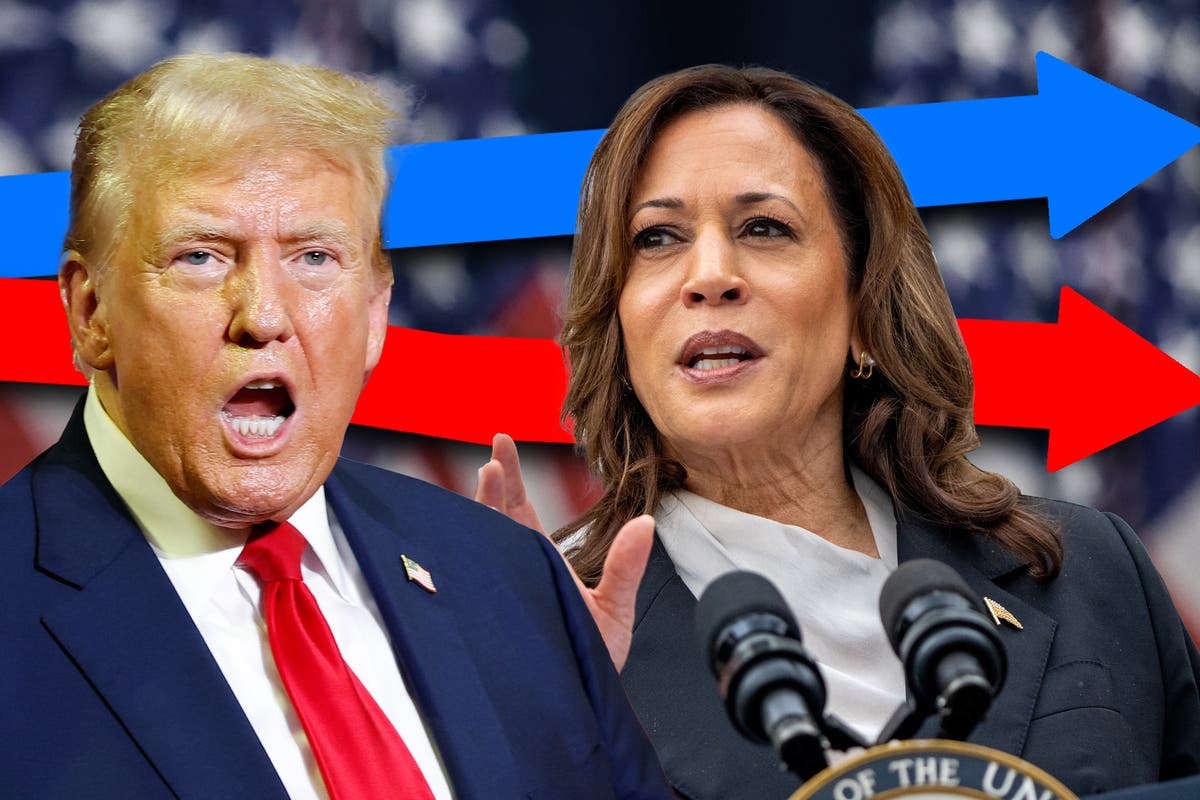World
Can Kamala Harris beat Donald Trump? Latest poll updates from the 2024 election

In less than 43 days, Vice President Kamala Harris will go head-to-head with Donald Trump as Americans cast their votes in the 2024 election.
After a post-debate flurry of favorable polling for Harris, new polls from the Sun Belt states show considerable improvement for Trump, particularly in Arizona.
Separate swing state polls from the northern states show that Harris has etched out a strong 5+ point lead in both Pennsylvania and Michigan, while a third battleground is too close to call.
The candidates are preparing for an intense final stretch of the campaign, with the needle ready to swing either way. So how will Harris and Trump fare in November?
Harris has a 2.9-point lead over Trump in the latest average of national polls, collated by FiveThirtyEight. On average, Harris has been marginally ahead of Trump in national polls.
But despite what appears to be a slight Harris lead, Trump is leading in three Sun Belt states, according to fresh polls from The New York Times.
Trump has a 5-point lead over Harris in Arizona and a 4-point lead in Georgia, with a more modest 2-point lead in North Carolina.
This is a stark change from the same poll in August, when Harris led in both Arizona and North Carolina, within the margin error.
In Arizona in particular, the two candidates have virtually flipped their support; Trump is at 50 percent of the vote and Harris at 45 percent, while the opposite was true last month.
It is worth noting that Harris is only 2 points behind Trump in North Carolina, at 47 percent to 49 percent. Trump has won the state in both previous elections.
In Arizona — a historically Republican state that has 11 electoral college votes and flipped for Biden in 2020 — Trump’s 5-point lead may be a concern for the Harris campaign.
Meanwhile, this is certainly good news for the Trump campaign, which has made frequent stops in the state over the summer.
So why the turn?
In a state that borders Mexico, some 1 in 5 (19 percent) of Arizona voters say that immigration is the most important issue affecting their vote, according to the same poll.
This is second to the economy, which is the number one issue impacting voters statewide and nationwide.
The majority (51 percent) of Arizona voters believe that Trump is better equipped to handle the top issues, which has flipped since August when Harris was slightly more trusted.
This indicates that, despite the overall enthusiasm for Harris’s debate performance, Arizona voters may have actually favored Trump and his approach to key issues.
Demographics
A separate poll from The New York Times and Siena College last week has Trump and Harris in a national deadlock, each at 47 percent of the vote among likely voters.
This is a slight shift from the same poll in early September, which had Trump at +2 points ahead of Harris in a surprise result.
The new poll, taken after the debate and with 2,437 likely voters, had 67 percent of respondents saying that Harris performed well in the debate, compared to 40 percent who thought the same about Trump.
Harris retains a strong lead among women (12 points ahead), while Trump enjoys a 14-point lead among men.
In particular, Harris has improved her vote share among under-34s following the debate, with a 7 percent increase to 58 percent of the vote and a 21-point lead over Trump.
Meanwhile, her lead within the 30-44 age bracket has shrunk, with Trump just 4 points behind; though Trump’s margin in the 45-64 age bracket has also decreased to just 2 points.
Make sense of the US election with The Independent’s experts in our exclusive virtual event ‘Harris vs. Trump: who will make history?’ Reserve your space here.
Among white, college-educated voters, the early September poll showed a 12-point preference for Harris. Following the debate, this group has seen the most substantial jump, with a 25-point lead for Harris at 61 percent of the vote.
Interestingly, a pre-debate poll from The New York Times showed that nearly a third of voters (28 percent) felt they needed to learn more about Harris, compared to 9 percent who would say the same about Trump.
But the debate was helpful for Harris in that regard, as half of voters (50 percent) feel that that they “learned a lot” about her during the debate, with just a third saying the same about Trump, according toThe New York Times poll.
Battlegrounds
Separate polling from Quinnipiac University in three key battleground states shows a promising lead for Harris — but there’s still room for Trump to turn things around.
In Pennsylvania, which hosted last week’s head-to-head debate, Harris leads by 6 points, with 51 percent of the vote, compared to Trump’s 45 percent.
Harris also enjoys a strong 5-point lead in Michigan at 50 percent, with Trump at 45 percent.
Part of this could be attributed to Harris’s particularly strong support among Michigan women, which is higher than the national average.
“With a gender gap as wide as Lake Michigan, Harris leads Trump by about 20 percentage points among women and Trump leads Harris among men by half that,” says Quinnipiac University analyst Tim Malloy.
Meanwhile, in Wisconsin, neither candidate has managed to carve out a real lead. Since Biden won the state by a hairline in 2020 — just 0.63 per cent — we could see a repeat situation in November.
In the southern battlegrounds, as detailed above, Trump is now in the lead.
Favorability
The vice president has suffered overall negative favorability ratings since July 2021, which is not uncommon for those holding public office.
But on Sept. 18, for the first time in over three years, Harris’s positive and negative favorability ratings were equal, according to the average of all favorability polls collated by FiveThirtyEight.
The debate may have been Harris’s chance to turn around her public perception, and ultimately foster a more favorable opinion of herself and her campaign.
The same cannot be said of Trump, whose net favorability is at a -9.9 negative rating, and has been negative since the last election. JD Vance also entered the race with a negative rating, which has only grown with time, now at -10.7 percent on average.
Democratic running mate Walz is the only candidate who entered the race with a positive rating and has kept it, with an average favorability rating of +3.9 according to FiveThirtyEight.
However, incumbent President Joe Biden has also suffered negative ratings since September 2021; and has the lowest favorability on average, at -14.6 percent.
Trust in Trump or Harris?
On major issues, trust for Harris and Trump is split down the line.
An ABC News poll shows that Americans believe Trump will better handle the economy, inflation and immigration, while Harris is more trusted on healthcare, gun violence, and abortion, among other issues.
The economy remains the most important factor for many voters, with an Independent analysis showing that economic issues are pivotal for independent voters in many key states.
As we near the one-year mark of the October 7 Hamas terror attack on Israel, Americans say they are more confident (+6 percent) in Trump’s ability to handle the Israel-Hamas war; though only half of Americans view the war as important to their vote.
CNN’s snap poll following the first Trump-Harris debate shows that Harris managed to turn the tide with some voters.
In the wake of the debate, more voters now believe Harris better understands the issues of people like them (44 percent) compared to Trump (40 percent). Before the debate, the opposite was true.
Independents
In a pivotal shift, Harris also leads Trump by +7.7 percent among independent voters, according to a new poll from Emerson College (up to September 4).
Capturing the independent vote will be crucial for either Harris or Trump to take the lead in this election. This is also the most likely group to vote for a third-party candidate, though with RFK Jr out of the race, this has dwindled to just 4 percent of independents.
The nationwide Emerson College poll has 49.5 percent of independents saying they would vote for Harris, compared to 41.8 percent for Trump.
This is a substantial jump from the same poll one month ago, which showed Harris just inching ahead of Trump (46 percent to 45 percent) among independent voters.
However, 5 percent of independent voters say they are still undecided, and the elusive voter group is difficult to pin down, with higher variation between polls and regions than other demographics. Nonetheless, Harris can be credited with mobilizing the non-partisan voter base, whose support is much stronger since Biden dropped out.
While Trump is taking home rural voters, at 63 per cent, Harris leads among both urban-resident (58 percent) and suburban voters (56 percent).
Suburban voters chose Trump over Hilary Clinton in 2016, while in 2020, Biden flipped the lead for Democrats.










